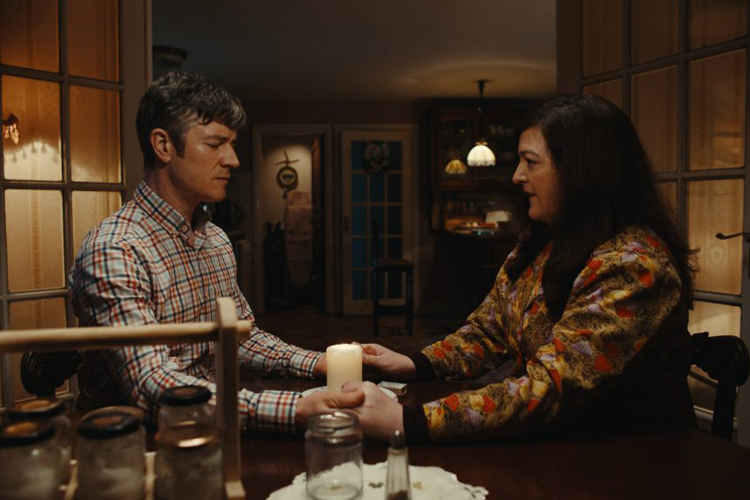If you want to take a risk without, you know, doing something risky, try watching a director’s debut feature. Like most people undertaking a monumental task for the first time, fledgling filmmakers haven’t yet honed their strengths or diminished their weaknesses, which usually results in a will-they-won’t-they game of trusting their instincts. Extra Ordinary—the debut feature from Mike Ahern and Enda Loughman—fully trusts its weirdest, zaniest instincts, for better or for worse.
The movie stars Irish comedian Maeve Higgins as Rose Dooley, a lonely woman who works as a driving instructor because her previous job ended in unplanned patricide. Her father, a well-known paranormal investigator, included the spiritually gifted Rose in his ghostly pursuits until she flubbed an incantation and caused a fatal workplace accident. Determined to avoid the killing of another loved one, Rose ignores the hauntings that plague her little Ireland town and spends her time eating yogurt on an exercise ball. But when a handsome man named Martin Martin reaches out to Rose because his daughter was kidnapped by a satanic rockstar, she can’t help but get back in the game.
Sound ridiculous? Good! Extra Ordinary wears its ridiculousness like a sweater. For all its insane subject matter, Extra Ordinary is a warm, comfortable movie, a comedy for a cozy night on the couch (or a cushy theater seat). Ahern and Loughman nail the tone down from the get-go: it’s relaxed, finds wit in brevity, and doesn’t take the paranormal seriously at all. Ghostbusters looks like a straight-up drama next to this offbeat indie. Instead of harshing its mellow with a big ghost baddie, Extra Ordinary starts with small stakes and switches them up rather than gradually heightening them. Each scene introduces a fresh mini-hell to either be resolved in that scene or joked about in a later one. It’s like a movie comprised entirely of kooky b-plots.
That silly sensibility is made even more special by its tonal partner: sincerity. The lackadaisical approach to the extraordinary is paired with an earnest approach to the ordinary. The movie takes its characters’ feelings seriously, threading its simple ghost metaphors (a ghost is someone we can’t let go of; being possessed is seeing life from someone else’s perspective) into a straightforward tale of love and loss and learning to love again. It’s predictable, but the movie doesn’t pretend it isn’t—the sincere personal story grounds the more detached ghost story, preventing it from becoming an exercise in cynical comedy where everyone and everything deserves to be laughed at.
This seesaw between normal and paranormal allows Extra Ordinary to dabble in restrained character interactions and overblown body horror simultaneously, which is exemplified by interplay between Maeve Higgins’ genuine performance and Will Forte’s hammy villain. By treating passing emotions with respect and laughing off grave danger with a flick of its wrist, the movie fashions a distinctive, quirky personality for itself—quite a feat, seeing as quirk has been commodified and repackaged into a copy/paste formula that can be applied to any movie. The spirit haunting Extra Ordinary is one of authenticity.
Watching Extra Ordinary is like hearing a friend tell a funny story for the third time: they let the comedic moments speak for themselves, don’t mistake manic intensity for absorbing storytelling, and know exactly where to pause for a laugh. And, perhaps most importantly at all, they haven’t told the story enough times for it to start feeling old or unoriginal. Not every joke has to land for the story to be a hilariously good time.
★★★★½ (4.5/5)




